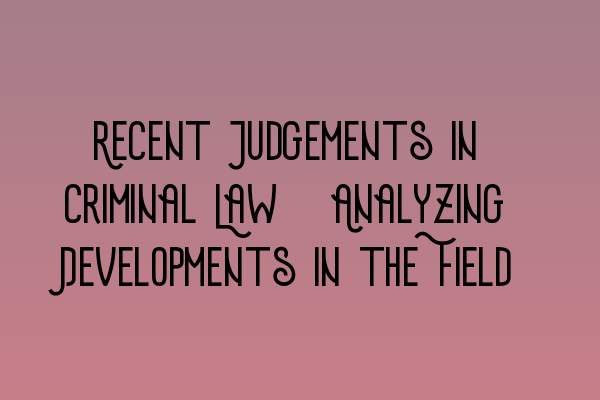Recent Judgements in Criminal Law: Analyzing Developments in the Field
As criminal law continues to evolve, keeping up with the recent developments and judgements is crucial for legal practitioners and aspiring solicitors. Every new judgement has the potential to shape the future interpretation and implementation of criminal law in the UK. In this blog post, we will explore some of the recent notable judgements and their implications for the field.
1. Smith v. R ([2021] UKSC 56)
One of the most significant recent judgements in criminal law is the case of Smith v. R. This landmark ruling by the UK Supreme Court has brought important clarifications to the principles surrounding self-defense in criminal cases. The judgement significantly expands the scope for individuals to claim self-defense in situations where they reasonably believe force is necessary, even if their beliefs are mistaken. This judgement has far-reaching implications and has been widely discussed and debated in legal circles.
To better understand the implications of Smith v. R and its impact on criminal law, SQE candidates can benefit from practicing SQE 1 practice exam questions and engaging in mock tests like SQE 1 practice mocks FLK1 FLK2. These resources provide an opportunity to apply legal knowledge and help in preparing for SQE Criminal Law & Practice exams.
2. R v. Jones ([2020] EWCA Crim 1000)
The case of R v. Jones is another recent judgement that has garnered attention in criminal law circles. This Court of Appeal decision clarifies the legal requirements for establishing the defense of diminished responsibility in murder cases. The judgement provides clearer guidelines on the factors that should be considered when assessing diminished responsibility, highlighting the importance of psychiatric evidence and its persuasive weight.
To enhance your understanding of the legal principles outlined in R v. Jones, it is recommended to explore SQE 2 preparation courses, which cover criminal law and practice in-depth. These courses provide comprehensive materials and case studies to help law students and practitioners grasp the nuances of different legal defenses, including diminished responsibility.
3. Regina v. Green ([2021] UKSC 57)
The recent judgement in Regina v. Green, delivered by the UK Supreme Court, focuses on the issue of joint enterprise in criminal law. The decision emphasizes the need for more clarity and precision when instructing juries on the concept of foresight in joint enterprise cases. It highlights the importance of correctly assessing a defendant’s individual responsibility and involvement when determining guilt.
To stay up to date with the latest developments in joint enterprise law and criminal law overall, it is essential to engage in ongoing professional development and stay informed about the SRA SQE exam dates. SQE Law offers comprehensive SQE 1 preparation courses and SQE 2 preparation courses that cover the necessary legal knowledge and skills required to succeed in the SQE Criminal Law & Practice assessments.
Conclusion
Staying informed about recent judgements in criminal law is vital for both aspiring solicitors and experienced practitioners. Being aware of these significant developments allows legal professionals to provide effective representation to their clients and navigate the complexities of the criminal justice system.
By regularly exploring judicial decisions like the ones discussed in this blog post, and by using resources such as SQE 1 practice exam questions and SQE 2 preparation courses, legal professionals can continuously expand their knowledge and skills in criminal law. This ongoing commitment to professional development ensures that solicitors can provide the highest quality legal advice and representation to their clients.
